

Not for Profit: Six Questions for Martha Nussbaum. Is America making a mistake by orienting its education system towards national economic gain?
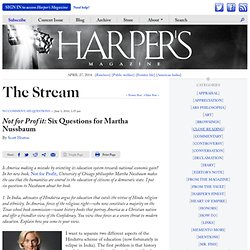
In her new book, Not for Profit, University of Chicago philosopher Martha Nussbaum makes the case that the humanities are central to the education of citizens of a democratic state. I put six questions to Nussbaum about her book. 1. In India, advocates of Hindutva argue for education that extols the virtue of Hindu religion and ethnicity. In America, forces of the religious right—who now constitute a majority on the Texas school book commission—want history books that portray America as a Christian nation and offer a friendlier view of the Confederacy. I want to separate two different aspects of the Hindutva scheme of education (now fortunately in eclipse in India).
Frantz Fanon Racisme et Culture. Au fait, c'est quoi, "l'effet Matilda"? 2% de noms de rue attribués à des femmes célèbres (nous en parlions dans notre revue de web pas plus tard qu’hier), à peine plus de 3% de personnages historiques féminins parmi ceux cités dans les manuels scolaires (ainsi que le révélait il y a quelques semaines une étude du Centre Hubertine Auclert), seulement 2 femmes au Panthéon français (dont l’une y repose en tant qu’épouse)… Mais pourquoi les femmes sont-elles si rares au contingent de ceux dont on reconnait l’apport essentiel aux progrès de l’humanité?
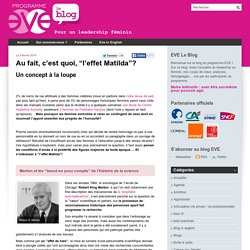
Prisme sexiste (éventuellement inconscient) chez qui décide de rendre hommage ou pas à une personnalité en lui donnant un nom de rue ou en lui accordant un paragraphe dans un ouvrage de référence? Traditions & procédures - TEDxParis 2013 - Clair Michalon. How to Fight - Carlos Andrés Gómez. D’autres futurs sont possibles. Le progrès n'est pas linéaire. Weltanschauung, Vision du monde. Un article de Wikipédia, l'encyclopédie libre.
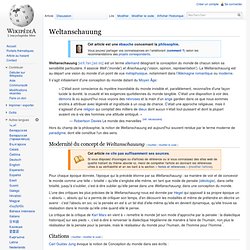
Weltanschauung [vɛlt.ʔanˌʃaʊ.ʊŋ] est un terme allemand désignant la conception du monde de chacun selon sa sensibilité particulière. Il associe Welt ('monde') et Anschauung ('vision, opinion, représentation'). La Weltanschauung est au départ une vision du monde d'un point de vue métaphysique, notamment dans l'Allemagne romantique ou moderne. Il s'agit initialement d'une conception du monde datant du Moyen Âge: — Robertson Davies Le monde des merveilles [réf. nécessaire]
World view. Origins[edit] Linguistics[edit] The founder of the idea that language and worldview are inextricable is the Prussian philologist, Wilhelm von Humboldt (1767–1835).

Humboldt argued that language was part of the creative adventure of mankind[vague]. Culture, language and linguistic communities developed simultaneously, he argued, and could not do so without one another. In stark contrast to linguistic determinism, which invites us to consider language as a constraint, a framework or a prison house, Humboldt maintained that speech is inherently and implicitly creative. Cosmovisión. Cosmovisión o "visión del mundo" o en la forma original alemana Weltanschauung (AFI: [vɛlt.ʔan ʃaʊ.ʊŋ]); es una imagen o figura general de la existencia, realidad o "mundo" que una persona, sociedad o cultura se forman en una época determinada; y suele estar compuesta por determinadas percepciones, conceptuaciones y valoraciones sobre dicho entorno.
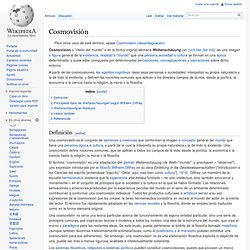
This Page is About WORDS!!! Steven Pinker: What our language habits reveal. English Is an Overwhelmingly Positive Language - Hans Villarica. University of Vermont mathematicians analyze billions of words in literature, music, and even Twitter, and find that happiness is a constant.

PROBLEM: Last month, University of Vermont researchers led by mathematician Peter Dodds proclaimed that average global happiness had been dropping for the past two years after studying billions of tweets worldwide. METHODOLOGY: To verify their findings and check if English is inherently positive or negative, the scientists analyzed billions of words from Twitter, a half-century of music lyrics, 20 years of The New York Times, and millions of books going back to 1520. After finding the 10,222 most frequently used English words from these four sources, they asked a group of volunteers to rate the emotional temperature of these words.
A positive word like "laughter" was given an 8.5 score, for instance, while a negative word like "terrorist" was given a 1.3 rating. CONCLUSION: English is strongly biased toward being positive. 11 Untranslatable Words From Other Cultures. Kintsukuroi. 5 Insane Ways Words Can Control Your Mind. On some level we already know that language shapes the way we think.

We're automatically more afraid to fight a guy named Jack Savage than somebody named Peewee Nipplepuss, even if we've never seen either of them before. It's totally illogical, but you probably run into an example of that every day, and don't notice it. While we tend to think words are just sounds we make to express ideas, science is finding that language is more like a fun house mirror, warping what we see in mind-blowing ways. For instance ... Speaking English Makes Us More Likely to Blame People Let's say your roommate Steve is jumping on your bed. How will you answer? What's Wrong With Our Culture. Thought-provoking 5 minutes on the state of the world from the late, great Alan Watts, a man far ahead of his time.

Created by The Omega Point Project. “Your world is an illusion. From the day you were born, you have been conditioned. Une tribu en Amazonie regarde pour la première fois une vidéo sur notre civilisation. You can lead a human to knowledge... Before you speak... T.H.I.N.K. Faire grandir un cerveau. Think while it's still legal. The day that Einstein feared... I can explain it to you... Partager le réel. Science & Humanities. Littérature du complot: lectures et interprétations. Reading Literature Makes Us Smarter and Nicer. Gregory Currie, a professor of philosophy at the University of Nottingham, recently argued in the New York Times that we ought not to claim that literature improves us as people, because there is no “compelling evidence that suggests that people are morally or socially better for reading Tolstoy” or other great books.
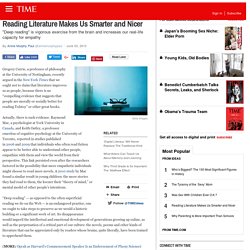
Actually, there is such evidence. Raymond Mar, a psychologist at York University in Canada, and Keith Oatley, a professor emeritus of cognitive psychology at the University of Toronto, reported in studies published in 2006 and 2009 that individuals who often read fiction appear to be better able to understand other people, empathize with them and view the world from their perspective. This link persisted even after the researchers factored in the possibility that more empathetic individuals might choose to read more novels. Surprising Book Facts.
Neil Gaiman: Why our future depends on libraries, reading and daydreaming. It’s important for people to tell you what side they are on and why, and whether they might be biased.
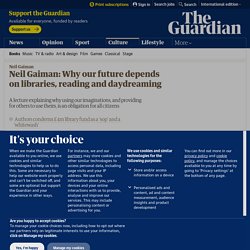
A declaration of members’ interests, of a sort. So, I am going to be talking to you about reading. I’m going to tell you that libraries are important. Lire des "fictions littéraires" améliore votre intelligence émotionnelle. Orwell et la " common decency " - Le libéralisme et la morale commune par Jean-Claude Michéa. « On ignore trop souvent que c’était qu’il [Orwell] avait mené sa lutte antitotalitaire, et que le socialisme, pour lui, n’était pas une idée abstraite, mais une cause qui mobilisait tout son être, et pour laquelle il avait d’ailleurs combattu et manqué se faire tuer durant la guerre d’Espagne. »